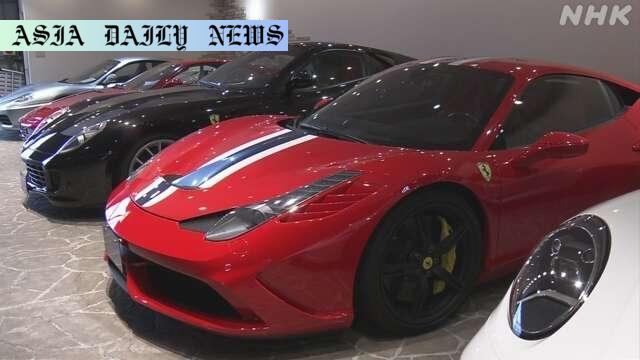Supercars fail to escape scrutiny as Japanese tax authorities intensify investigations into undeclared income from high-value resales.
Supercars in Japan serve as both luxury and investment, leading to taxation scrutiny.
A former Osaka medical director failed to declare $3.4 million from supercar resale profits.
Luxury foreign car imports and resales experience a surge in value and demand, driven partly by international buyers.
Tax agencies are targeting undeclared income among the wealthy through specialized teams.

Supercars and the Rising Taxation Scrutiny in Japan
Recently, Japanese tax authorities have taken decisive action against a former Osaka-based medical corporation director for failing to declare millions in income generated from the resale of high-value supercars. This incident is a reflection of a broader challenge facing taxation agencies as they strive to address attempts by affluent individuals to capitalize on luxury assets without properly disclosing profits for tax purposes. The case came to light after the Tokyo Regional Taxation Bureau imposed back taxes amounting to $2 million on undeclared income worth approximately $3.4 million. The individual resold high-demand supercars, including models like Ferraris and Lamborghinis, over four years, with the authorities determining that such transactions were driven by investment motives rather than simple personal use. This distinction placed the profits squarely in taxable territory.
The Growing Supercar Market in Japan
Supercars have become a lucrative market in Japan, attracting both wealthy domestic buyers and international collectors. According to the Japan Automobile Importers Association, 2023 saw an all-time high in the number of expensive foreign-brand cars registered in the country. These vehicles, often priced above $138,000, include elite models such as Bugattis, Ferraris, and Lamborghinis. The association also highlighted that models originally sold for $241,000 are being resold for upwards of $414,000 in the pre-owned market. Showrooms in cities like Yokohama have reported significant interest from international brokers, further buoyed by the weakened yen, which makes Japanese cars competitive in global markets. This international demand has placed additional scrutiny on such transactions as affluent individuals look to leverage this burgeoning market for profit.
Diversified Asset Investing and Tax Implications
As asset management trends shift toward diversification, supercars have emerged as not only a symbol of wealth but also a resilient investment avenue. These vehicles, with distinctive chassis numbers and limited-edition appeal, are demonstrably capable of delivering substantial returns as their value appreciates over time. However, this very profitability raises significant legal and ethical questions concerning tax compliance. While vehicles intended for practical, day-to-day commuting are exempt from taxation, authorities take a different view on purchases intended for speculative or investment purposes. Racing driver and automotive critic Takei Hirofumi underscores the popularity of supercars among high-net-worth individuals, noting that these buyers often avoid counterfeit risks due to stringent verification processes tied to each car’s individual chassis identifier.
How Tax Authorities Are Responding
The rise in supercar resale profitability has not gone unnoticed by Japan’s National Tax Agency. Responding to this and other forms of undeclared income among the affluent, the agency has assembled specialized investigative teams to inspect high-value asset transactions. While the individual in this case declined to comment, the broader implications are hard to ignore. This increased scrutiny is likely to reshape the market, as affluent investors will need to exercise greater diligence in declaring their profits. For tax regulators, this represents a critical juncture in ensuring that high-earners contribute their fair share, especially as global wealth becomes increasingly opaque and difficult to track.
Broader Impacts on the Global Luxury Market
The growing investment in supercars has broader implications for the luxury market globally. As wealthy individuals diversify their portfolios, luxury goods like art, rare automobiles, and watches are becoming alternative asset classes. Supercars carry the allure of exclusivity, engineering refinement, and tangible investment potential, making them attractive to collectors and investors alike. This market dynamic, however, demonstrates how globalization encourages cross-border purchasing and resale, further complicating taxation policies and regulatory oversight. Moving forward, regulators will need to leverage advanced technology and international collaboration to ensure financial accountability among the wealthy elite.



Commentary
Supercars and the Blurring Line Between Passion and Investment
The recent case of undeclared income involving supercars in Japan raises complex questions about the evolving nature of luxury goods and their role as investment tools. At the heart of this issue is the challenge of distinguishing personal passion from profit-driven intent. Supercars, long regarded as objects of automotive admiration, are now crossing over into the realm of financial assets, with values increasing over time. However, this creates complications from a taxation perspective, as authorities grapple with identifying the fine line between ownership for use versus ownership for financial gain.
The Need for Greater Awareness Among Affluent Investors
This incident also underscores the growing need for awareness among wealthy individuals regarding their taxation responsibilities. In an era where almost every economic transaction leaves some form of data trail, the likelihood of successfully evading scrutiny is increasingly low. High-net-worth individuals who involve themselves in supercar resale must ensure they are well-versed in local tax laws or risk penalties that could overshadow their profits. The formation of specialized investigation teams by Japan’s National Tax Agency is a clear indicator of the intensifying focus on the affluent demographic and high-value transactions.
Global Lessons in Luxury Market Transparency
Beyond Japan, the implications of this story extend internationally. With luxury markets driving significant global trade, transparency and compliance will be crucial as cross-border transactions gain momentum. The rise in brokers from the Middle East buying Japanese supercars is just one example of how global demand is reshaping the market landscape. Governments and regulatory bodies must collaborate across borders for effective monitoring and enforcement. Similarly, buyers and sellers alike need to incorporate due diligence into their transactions to avoid running afoul of tax laws. In the end, balancing enjoyment, investment, and legal responsibility is key for all parties involved.